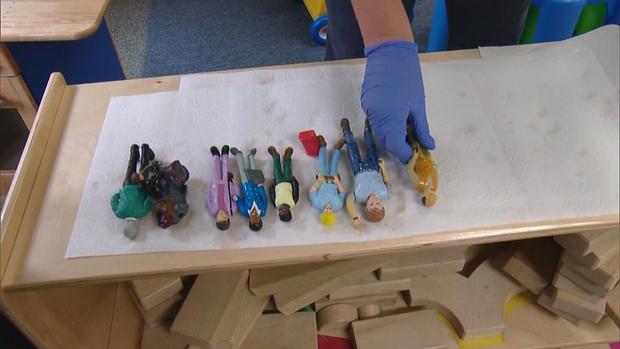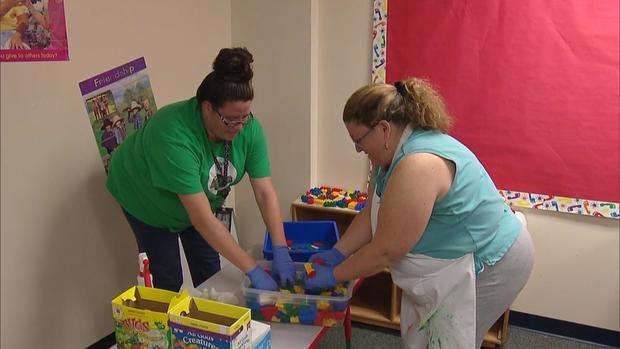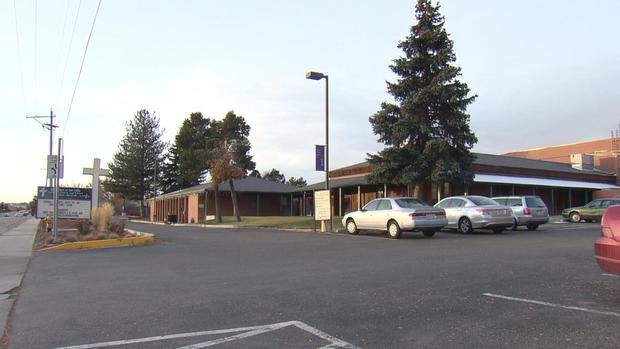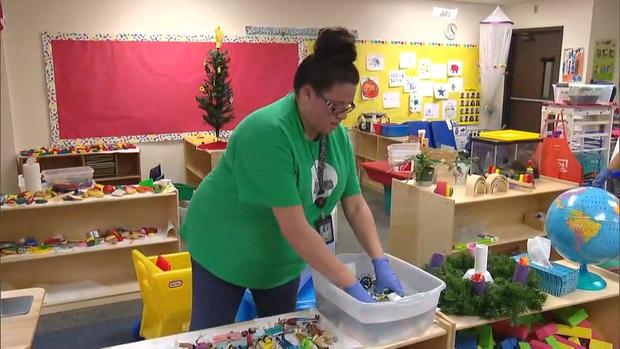Norovirus Shuts Down School
By Tom Mustin
CENTENNIAL, Colo. (CBS4)- Administrators closed a Centennial school after a Norovirus outbreak hit the classrooms. The Shepherd of the Hills school in Centennial has 200 students ranging in age from toddlers to 8th graders.
As many as 20 percent of the students showed some signs of the illness.
Wednesday afternoon, 2-year-old Clark Cannon was the only student at the Shepherd of the Hills school in Centennial.
Clark's mother and other volunteers spent the day disinfecting Legos and action figures, after a Norovirus outbreak caused the school to close its doors for the day.
"We determined we needed to do the best we could to protect our kids and so we determined we would take a day off," Pastor Brad Stoltenow told CBS4's Tom Mustin.
The outbreak affected 40 of the school's 200 students. Before they return, the empty halls and classrooms will be scrubbed with a powerful anti-bacterial solution.
"It's a bit scary," said parent Suzy Livingston
Livingston has a daughter in 6th grade at Shepherd of the Hills. She appreciates the school's quick action.
"I was glad the school was keeping us informed and letting us know before it spread any further," she said.
Norovirus causes cramping vomiting and diarrhea. Tri-County Health says the virus is very common in the winter months and is easily spread from person to person. They've seen an uptick in cases in the past few weeks.
"Norovirus accounts for most of the vomiting and diarrhea illnesses we see in our community, very common, very catchy... contagious, " said DR. Bernadette Albanese.
Stoltenow says in his 10 years at the school, classes have never been cancelled due to illness.
Parents like Livingston agree when it comes to protecting students like Clark Cannon. It's better to be safe than sorry, "I really appreciate the notice we got."
Health experts say the best way to combat Norvirus is to wash your hands frequently with soap and water.
The school is expected to re-open for class Thursday morning.
Additional Resources
The following FAQs about norovirus were shared with CBS4 by Rocky Mountain Hospital for Children:
Norovirus infection occurs in the stomach and intestines. It is most often called the stomach flu. Outbreaks often occur in areas with close contact such as:
- Cruise ships
- Restaurants
- Nursing homes
- Hospitals
Causes
Norovirus infections are caused by a specific group of viruses. The viruses can spread through:
- Contaminated water supplies, such as recreational lakes, swimming pools, wells, and water stored on cruise ships
- Raw or improperly steamed shellfish, especially clams and oysters
- Food and drinks prepared by infected food handlers who do not wash their hands properly after using the bathroom
- Surfaces, such as a door knob
- The viruses can also spread by direct contact with an ill person. This is common in a day care center or nursing home.
Risk Factors
Any person who ingests the virus is at risk of getting this infection. Older children and adults commonly get this infection. Even if you have been infected with norovirus in the past, you can become ill again if:
- You are exposed to a different type of norovirus
- Your last illness was more than 24 months ago
Symptoms
Symptoms may include:
- Nausea
- Vomiting
- Diarrhea
- Abdominal pain
- Headache
- Fever
- Chills
- Muscle aches
- Tiredness
Symptoms often appear within 24-48 hours of exposure to the virus. Symptoms often last about 1-3 days.
Treatment
A norovirus infection will go away on its own. Medical treatment is often not needed since the illness is often brief and mild. Most people will recover by resting and drinking plenty of fluids. Oral rehydration solutions are the best option to help replace fluids and electrolytes. These can be found in most drugstores. Severe dehydration may require IV fluids in a hospital but this is a rare complication in the United States. Antibiotics are not effective against viruses. There are no antiviral medications or vaccines used to fight or prevent this infection.
Prevention
To help reduce your chances of getting or passing noroviruses, please take the following steps.
Wash your hands thoroughly with soap and water:
- After using the bathroom
- After changing diapers
- Before preparing or eating food
- If you are caring for someone who is infected, make sure the person thoroughly washes his or her hands. If you are ill or caring for someone who is ill, immediately clean and disinfect contaminated surfaces using bleach cleaner. Remove and wash soiled linens. Use hot water and soap
- Wash fruits and vegetables
- Cook oysters and clams before eating them
- Do not prepare food if you have symptoms. The virus may continue to be in your stool for up to 3 days after your diarrhea has resolved. Wait 3 days after you have recovered before handling food again
- Throw away contaminated food
- If you are sick, do not attend work until symptoms have passed
Tom Mustin is CBS4's Weekend Anchor. He has been with CBS4 since 2002, and is always looking for great story ideas. Connect with Tom on Facebook or follow him on Twitter @TomCBS4.








